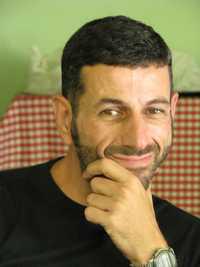As reported by Fridae.com in "Buenos Aires okays gay marriage in Latin America first," a court in the Argentinian capital affirmed for a male couple the right to be married under the city’s laws. Clearly, the idea that Latin America is still bound by dated notions of heterosexual machismo, needs revision. The fact is, there has been a lot of progress for gay equality on that continent in the last 20 years. This precedent-setting court decision is a fruit of a long period of organising and campaigning, news of which has rarely come to Asia.

As luck would have it, I am here in Trinidad and Tobago with an Argentinian activist. Marcelo Ferreyra is currently the Coordinator for Latin America and the Caribbean for the International Gay and Lesbian Human Rights Commission (IGLHRC), but before this he was actively involved in the gay rights struggle in his home country. I sat him down and asked him for the back story to that groundbreaking court decision.
“The movement actually began way back in 1967,” he said. “At that time, though, it was related to the feminist movement.”
And it got erased by the military dictatorship that took over in 1976.
After the military withdrew from government, there was a wave of democratisation, and people began to work on LGBT issues from about 1984 onwards again. “We had an association called Communidad Homosexual Argentina (CHA), and our main goal was to get institutional recognition for this group.”
An attempt to get a ruling by the Supreme Court was rejected in 1991; the court delivered a very homophobic argument.
What were CHA’s aims in those days?
Ferreyra: “In those days, each province had codes that made homosexuality and similar same-sex activity a misdemeanour. Buenos Aires City for example, had in addition a code that prohibited two people of the same sex dancing together. Our aim was to take out the laws.”
Slowly, things were beginning to change. Someone discovered a law that almost nobody knew of, that denied homosexuals voting rights. When this discovery was reported, “it was a big scandal,” recalled Ferreyra.
Then, in the early 1990s, Carlos Menem (President 1989 – 1999) was “parading about in North America and Europe, boasting about human rights and trying to get funding for the country.
“We helped organise protests everywhere the president went.”
This reached a climax when he went to Columbia University in New York. “A gay student asked him why if he boasted about human rights, CHA was denied legal recognition. Menem said he would take care of it personally, and he did. When he returned to Argentina, CHA was registered. After that, other gay groups could also be registered.”
Around the same time, Ferreyra was involved in a new group, called “Gays for Civil Rights” in its English translation. Its objective was to change society’s values with a five-year process: Engage the media; challenge the church; have a strong litigation strategy bringing cases to show discrimination in action.
“We had pro-bono lawyers, but we didn’t want funding.” Why not? I asked. “We didn’t want to be driven by the agenda of funders.”
One curious thing learnt through experience was that the “yellow newspapers” – i.e. the sensationalist tabloids – liked to write about homosexuality. “The subject sells,” said Ferreyra. “They were the first newspapers to publicise our case.”
Other newspapers soon followed and now even rightwing media will carry gay-related news.
Challenging the church was another aim. “We needed to show that the hate speech coming from the church was an inducement to hate crimes.” This was especially as in the early 1990s, Cardinal Antonio Quaraccino emerged as a very vocal opponent.
“He had a spot on national TV every Sunday morning, and he often used it to bash gays,” Ferreyra said. “On our part, we had someone monitoring what he said and getting our answer to the media immediately.”
They even sued him under hate speech laws twice. “In 1993, the judge, a Catholic woman, exonerated him, saying he had a right to say what he said because it was Easter!”
In 1994, even though they lost our case again, the timing of the case worked in their favour in terms of social opinion. “He delivered his homophobic speech just about a week after a terrorist bomb exploded at a Jewish community centre, reminding everybody of the anti-semitism of the Nazi period. So when the Cardinal said that if homosexuals want to escape, they should be sent to a special island, people became angry with him.”
Headlines in newspapers made it clear that such speech was abhorrent.
The court judgement – by a gay male judge this time – agreed that it was hate speech, but unfortunately, Argentinian anti-discrimination law didn’t include sexual orientation. So the Cardinal was let off.
But it was enough. “This episode made a major difference to social opinion.”
Only two years later, in 1996, Buenos Aires wrote a new constitution. There was a strong push to include sexual orientation as a protected class. “Even politicians who did not really support the idea didn’t dare oppose it,” said Ferreyra.
Further progress was made in 2003 when the national legislature voted for a civil union law. “After that, the strategy was to push for same sex marriage,” and the rest is history.











 Printable Version
Printable Version










Reader's Comments
[The court judgement – by a gay male judge this time – agreed that it was hate speech, but unfortunately, Argentinian anti-discrimination law didn’t include sexual orientation. ]
I think more gays in Asia may want to consider studying law and becoming a judge later. Gay judges understand gays' problems better.
Please log in to use this feature.